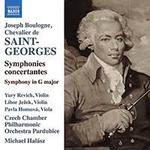|
Back
10/05/2021
Joseph Boulogne, Chevalier de Saint-Georges: Symphonie concertante in C major, opus 9, n° 1 – Symphonie concertante in A major, opus 9, n° 2 – Symphonie concertante in F major, opus 10, n° 1 – Symphonie concertante in A major, opus 10, n° 2 – Symphony in G major, opus 11, n° 1
Yury Revich, Libor Jezek (violin), Pavla Honsová (viola), Czech Chamber Philharmonic Orchestra Pardubice, Michael Halász (conductor)
Recording: House of Music Pardubice, Czech Republic (September 29 to October 2, 2020) – 64’56
Naxos Classics 8.574306 (Distributed by Naxos of America) – Booklet in English

   
One of the happy consequences of the so-called culture wars has been the rediscovery of the music of Joseph Boulogne, Chevalier de Saint-Georges (1745-1799). Composer, violinist, swordsman and teacher of Marie-Antoinette, Boulogne has sometimes been called the “Black Mozart”, but as listeners to several new releases of the Frenchman’s work will aver, the Chevalier stands very much on his own as a creator of enchanting music for symphony orchestra and chamber ensembles.
I had the pleasure recently to listen to an album of four Symphonies concertantes by Boulogne and his Symphony in G major performed by the Czech Chamber Philharmonic Orchestra Pardubice (a city less than 80 miles east of Prague) under the direction of Michael Halász. Naxos includes this album among its 18th century classics releases, a series which also features the composer’s violin concertos. Boulogne’s work has a unique charm and character which reminded me of some of the light but thoughtful offerings of the Mannheim School (Johann Stamitz et al).
These works were composed between 1777 and 1779, a decade before the French Revolution, and express the elegance and love of beauty that prevailed in the French court at that time. While not conspicuously original, they ring with good cheer and a delight in the process of creating music in the classical tradition, crisp and clean, free from Baroque convolution.
Halász conducts with a light touch, emphasizing the sonorities and graceful repetitive patterns that add interest and appeal to each section. It is always a pleasure to hear fine Czech ensembles such as the Chamber Philharmonic and the translucent purity of the soloists on this album: Yury Revich, solo violin I; Libor Jezek, solo violin II and Pavla Honsová, solo viola. Adding to the sparkling clarity of the music itself are the romantic images of the Chevalier. Born a slave, he rose to become Marie Antoinette’s teacher, and as a colonel in the French army, reportedly led 800 infantrymen and 200 cavalries in Europe’s first all-black regiment. A rumor persists, perhaps with a grain of truth, that Mozart was jealous of the accomplished musician and swordsman, basing the nefarious character, Monostatos in The Magic Flute, on the charismatic Moor.
As musical communities throughout the world seek to bring more diversity to their programming, we will see and hear more from this 18th century polymath whose creations, when played with skill and enthusiasm, never fail to delight us with the spirit of an earlier age.
Linda Holt
|